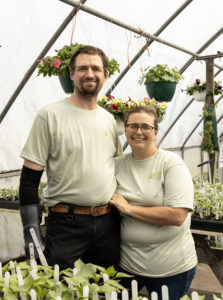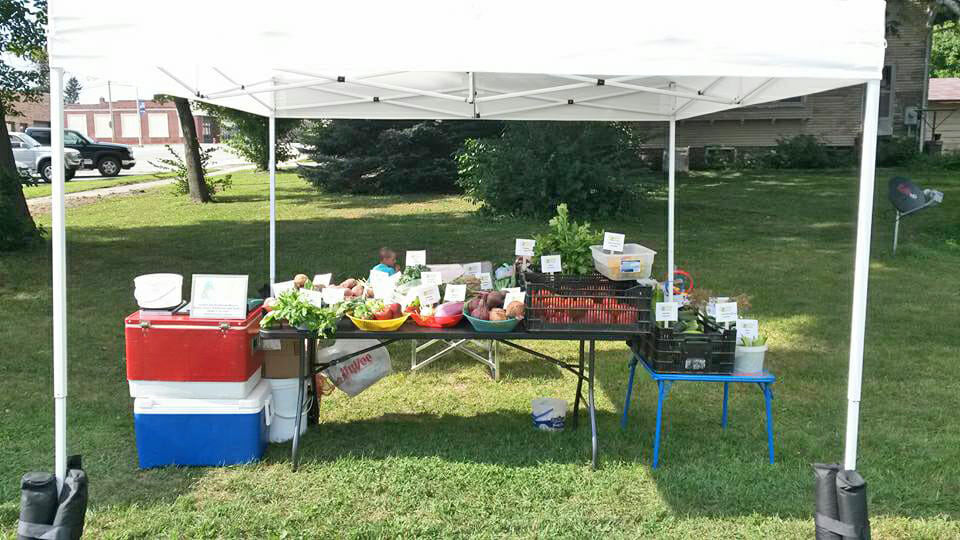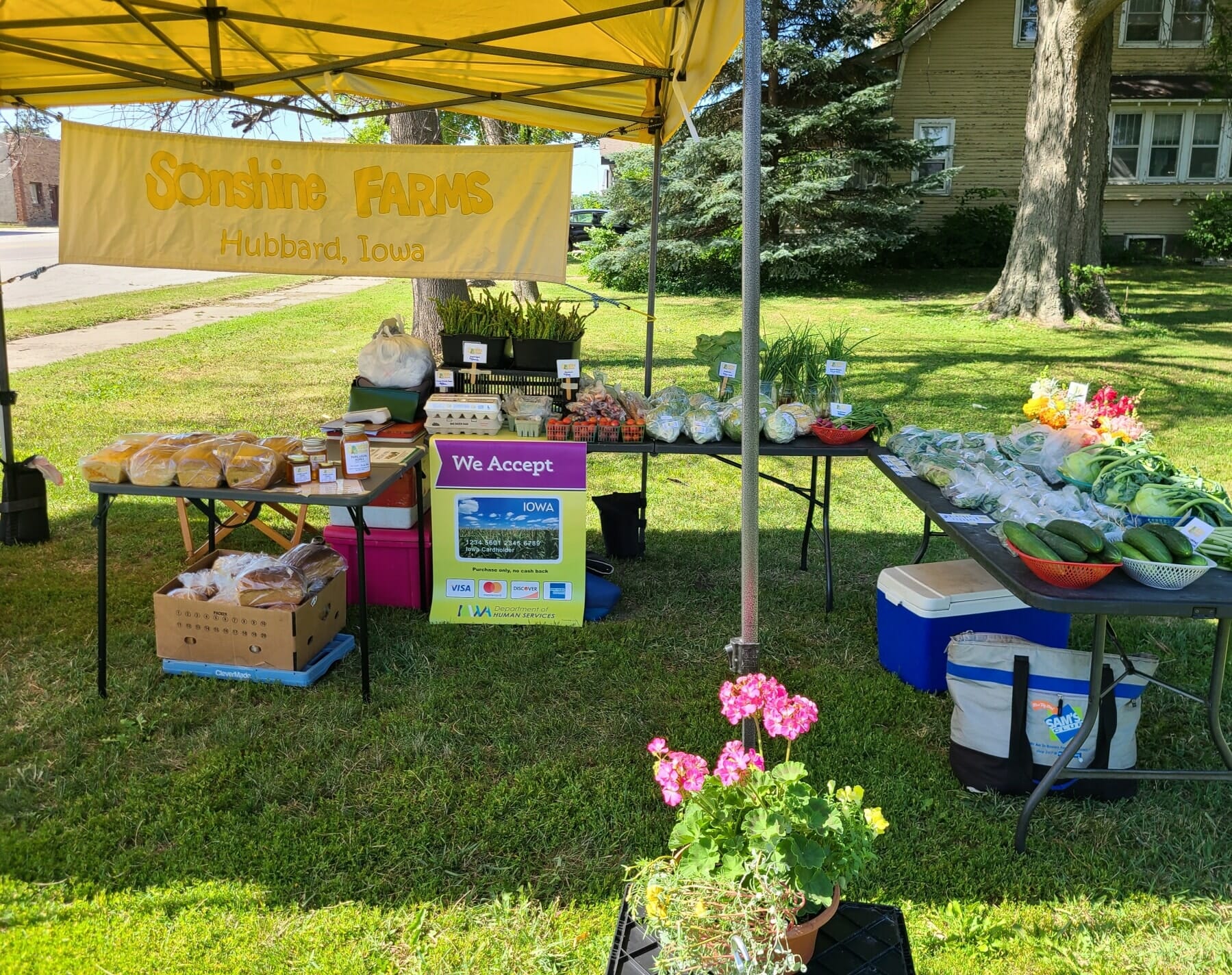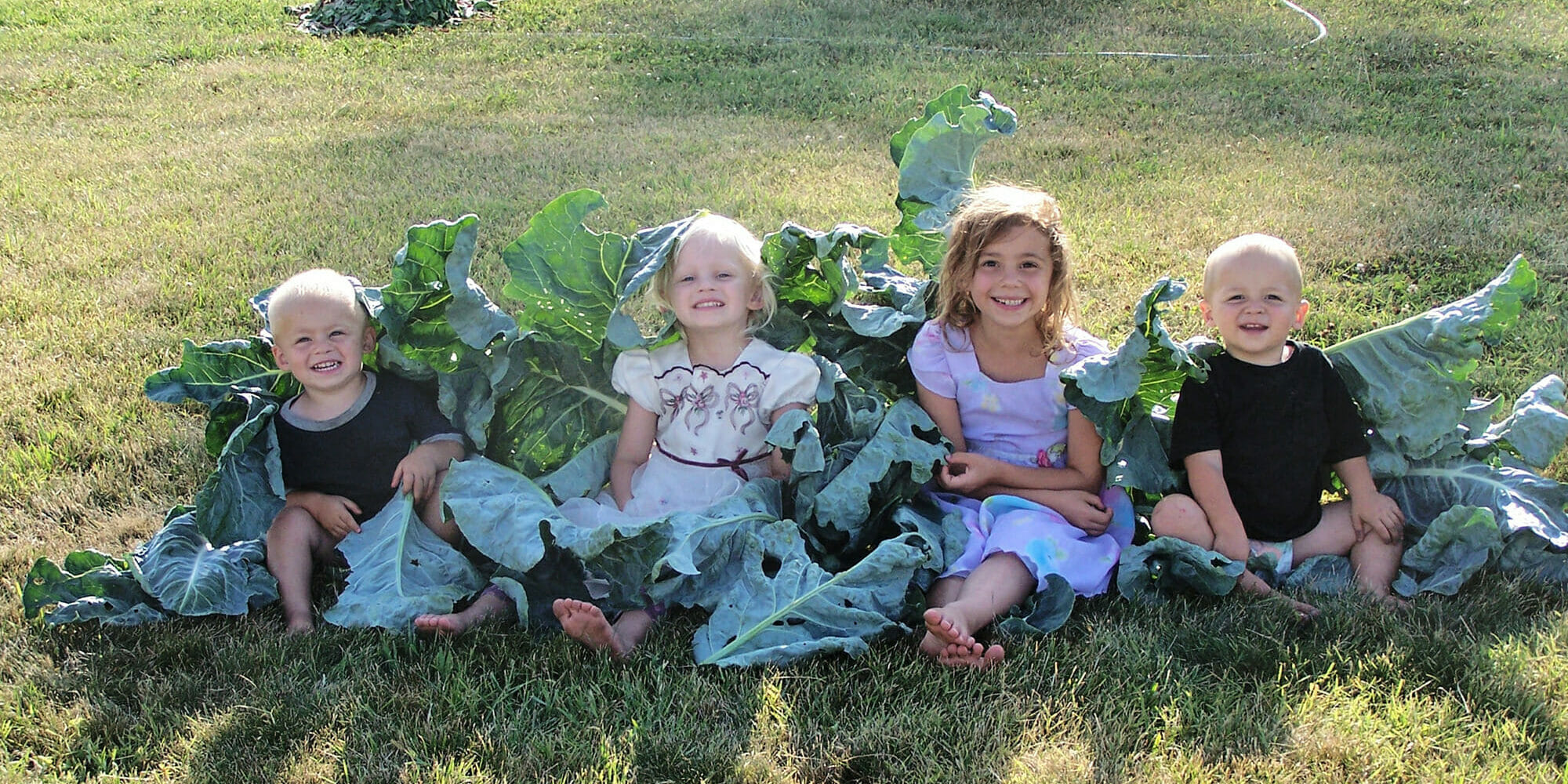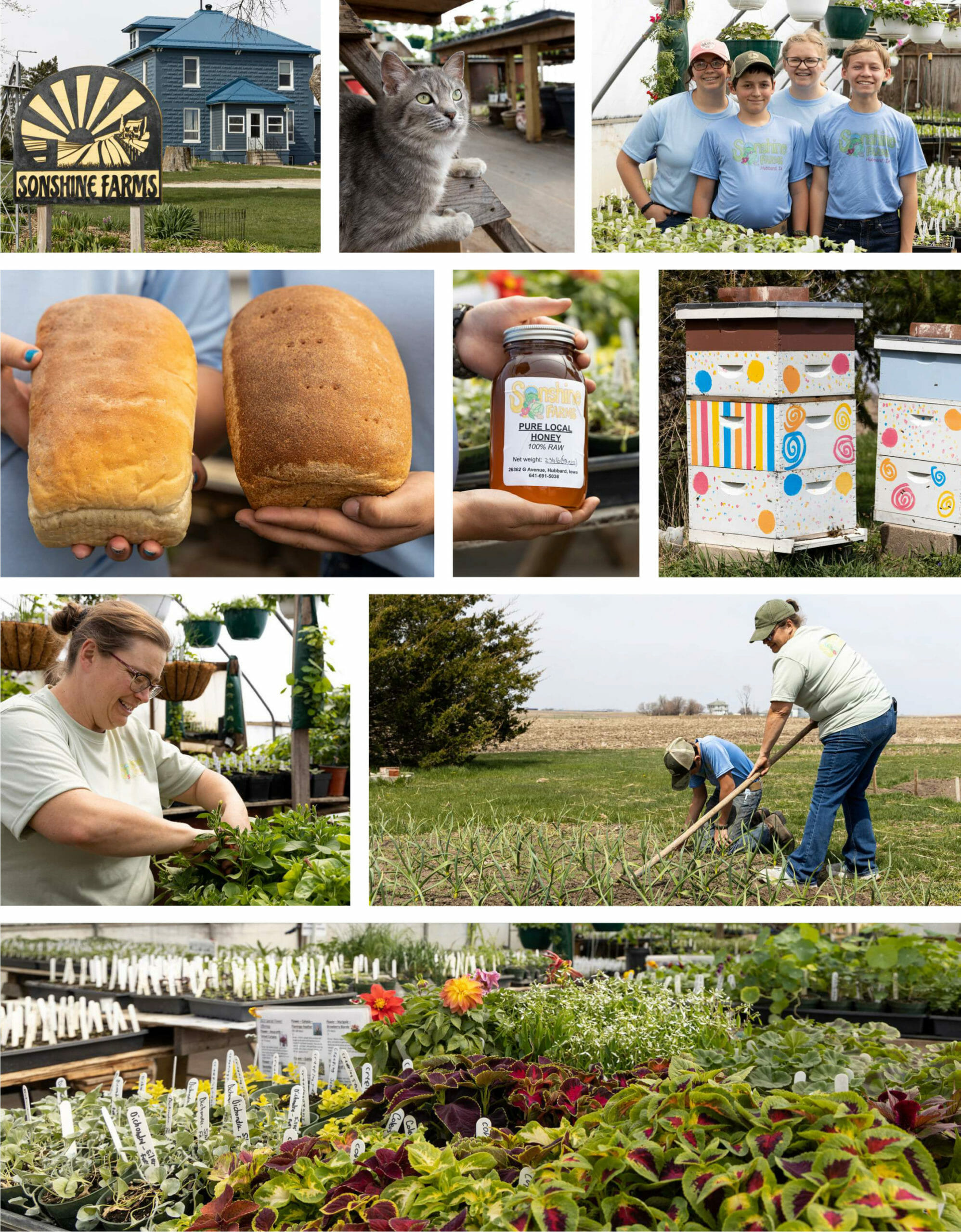Nurturing Rural Communities
Stephanie and Austin Meyers and their children – Hallie, Janae and twins Nathaniel and Samuel – own and operate Sonshine Farms near Hubbard, Iowa. They homeschool their children on their 3.5-acre farm, where they raise vegetables, flowers, honey, eggs, broiler chickens and turkeys that they market through on-farm sales and at farmers markets in several area towns, stores and restaurants.
Stephanie is a small-town doer. She didn’t set out to raise thousands of pounds of produce that she markets to multiple rural communities in her area. Yet today, she finds herself as the lynchpin in her very localized food system.
Building a Life
The path Stephanie and her family have taken is not the one she initially envisioned. In 2003, Stephanie graduated from Wartburg College with a degree in music education and music therapy. Following a six-month internship at a hospital in Arizona, she returned to her home state of Iowa and became engaged to Austin, her boyfriend of more than a year. The couple married and settled in State Center where Stephanie taught instrumental music at middle and high schools while Austin worked on a nearby farm.
But when the school district’s music program didn’t grow as quickly as expected, Stephanie’s position was eliminated after her second year of teaching. The pressures compounded from there.
In May 2005, when Stephanie was seven months pregnant, Austin was involved in a serious farm accident that required amputating his right hand, with multiple follow-up surgeries and therapy. Hallie was born on July 18, 2005, two months nearly to the day after the accident. What happened next felt to Stephanie and Austin like divine intervention.
They were awarded a settlement through workman’s compensation because of Austin’s on-the-job injury, which enabled them to buy their present farm near Hubbard.
“The heirs of the previous owners of the acreage dropped the price such that we were able to pay cash for the property with the money from the settlement,” Stephanie says. “That first winter and spring on the farm, we had some rough patches making it through. Our income went from over $70,000 to about $7,000 the next year.”
Yet with resourcefulness, vision and ingenuity, Stephanie and Austin were able to pull together and make things work. When a greenhouse near Mason City was taken down in 2009, they bought some secondhand parts from it to erect a structure that got them started with growing more things on their farm. By 2013, they constructed a hoop house structure that they still use to start all their seeds.
“Austin is such a visionary,” Stephanie says. “He pieced together the greenhouse and just wanted to grow things. It was great for his mental health.” Stephanie describes planting and growing all these garden crops as therapy. The family’s primary income came from Austin’s off-farm job, which required overnight hours. As a result, garden management fell largely to Stephanie. In addition, by that time, their family had grown to include four children under four years old – two girls plus twin boys.
In those early days, the Meyers family gave away many of the plants and produce they grew to members of their church and community. “Austin wanted us to grow into selling at markets,” Stephanie says, “but because of our small kids and Austin’s work schedule, I resisted.”
Then, in early 2015, they learned of plans for a farmers market in the nearby town of Roland. The couple decided to give it a try. They established their business, Sonshine Farms, and by July were selling at this weekly market every Thursday through September.
And that was just the beginning.
Growing as an Act of Service
By 2016, Sonshine Farms had multiple market streams. They sold at farmers markets in the towns of Hubbard, Roland and Jewell every Tuesday, Thursday and Saturday, respectively. They have also sold to local grocery stores, the Jewell Market and Hubbard Grocery, as well as a few local restaurants. The farmers market in Hubbard has since stopped running, but the others have grown over the years.
“It’s not easy. There are many late nights and early mornings,” Stephanie says. “Yet at the end of the season, it’s amazing to see the amount of food we raise. Our choice is to serve these communities that don’t have access to [local produce] otherwise.”
Being present and reliable is a key part of how Stephanie has grown the business. “We have found that consistency is key,” she says. “To build rapport and break into a bedroom-style community like Roland, where there is no grocery store, you must be there every week interacting with people, checking in with relationships, asking, ‘How are you doing? How are things going?’ And people tell us regularly how much they appreciate us being there.” Her generous spirit and dedication contribute richly to these rural communities.
For the 2023 season, Stephanie is officially co-managing the Roland Farmers’ Market and hopes to take it to the next level. “We are trying to really build it up to support the town of Roland,” she says.
For Stephanie and Austin, growing food is a faith-driven act of service for these rural communities, and for their family. “I was trained to be public school teacher, and I planned that for my kids,” Stephanie says. “But facing the challenges through Austin’s accident and those early years of family life changed how we value our time together. Our business has been modeled around relationships. For us, our work is growing for the glory of God in service to others, and being able to pour all this into our kids makes such a difference.”
A Family Endeavor
When she first started selling at markets, her children were 4, 6 and 8 years old. To make attending the markets possible, she had to take them along. “We took the time to train them when they were young,” she says. “They would help carry things, and we would pack sack suppers of sandwiches and chips and special cookies, or whatnot. We would have a special activity bag and a blanket, and that was their area.”
The Meyers kids and the family business have grown up together. As the girls entered their teens, they identified activities of their own that they wanted to pursue, like mission trips. With the resourcefulness and ingenuity modeled from their parents, Hallie and Janae developed their own baking business – Bakery Girls – and sold bread and baked goods alongside the Sonshine Farms market stand to earn their own way.
“They knew they would have to work for the money, so they decided to take up baking,” Stephanie says. “My mother-in-law and father-in-law helped them bake for markets each week.”
Stephanie describes her children’s contributions with pride. “Exploring these opportunities has really helped them each find their skills and passions. Hallie, my 16-year-old, is very much motivated to be the face of the business. She is so organized and runs markets for me frequently. Janae, who is 14, loves to bake but does not love marketing or interacting with customers. Samuel, age 12, is the younger twin and is very gifted with mechanical work – oil changes and fixing things. Nathaniel is still looking for his motivation and skills, but the journey to that discovery is fun, and we can give him the grace and space to do that.”
With homeschooling lessons over in early April every year, the entire family looks forward to what they call the “skills-building” portion of their education. Stephanie says her goal this summer is to treat preparing for and staffing the farmers markets as a job training experience. “I give them hours, a list of tasks and a little guidance, and they do it on their own,” Stephanie says. The kids are paid for their work, she adds, but the first hour of their labor is always for free. “That’s how we balance being family members with contributing to the family business.”
Answering a Call
In early 2023, Austin secured a new position with the Hubbard-Radcliffe Community School District that led to big changes in their farm and home operations. A more flexible work schedule with daytime hours, rather than the overnight schedule he worked for years, has dramatically increased his availability to support the farm.
The new job has facilitated other changes in thinking as well. As the children grow and begin to plan next steps, Stephanie is starting to look toward what might come next for the farm – and she is excited about her vision for the future.
“We would love to be able to bring a lot of our business to our farm – to have a store where customers buy on our farm,” Stephanie says. She also dreams of offering classes and retreats “to teach people how to support themselves through a small garden plot or converting your yard to food production, or how to process their food.”
“I’m an educator at heart,” she adds. “I want to be able to offer classes and support people where they are.”
Stephanie’s commitment to service and the sense of connection she fosters are both elemental and essential to weaving the fabric of rural communities. Approaching the Meyers family’s farm stand means entering the warm glow they create around them through the children’s eager smiles, Stephanie’s genuine hospitality and the abundant food they grow and share with love.
“This feels like the calling of my life to be able to meet people where they are and speak life to them,” Stephanie says. “To be able to encourage and see people means more to me than any of it; vegetables are the bonus.”


